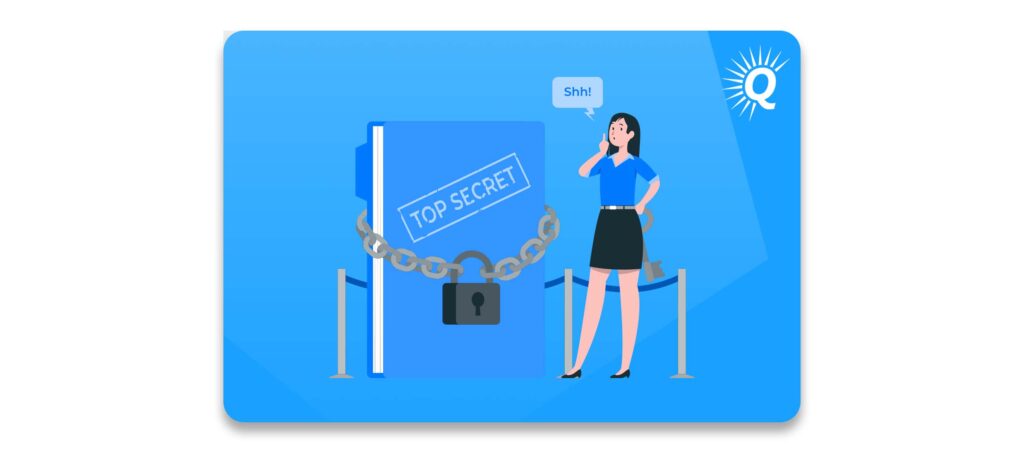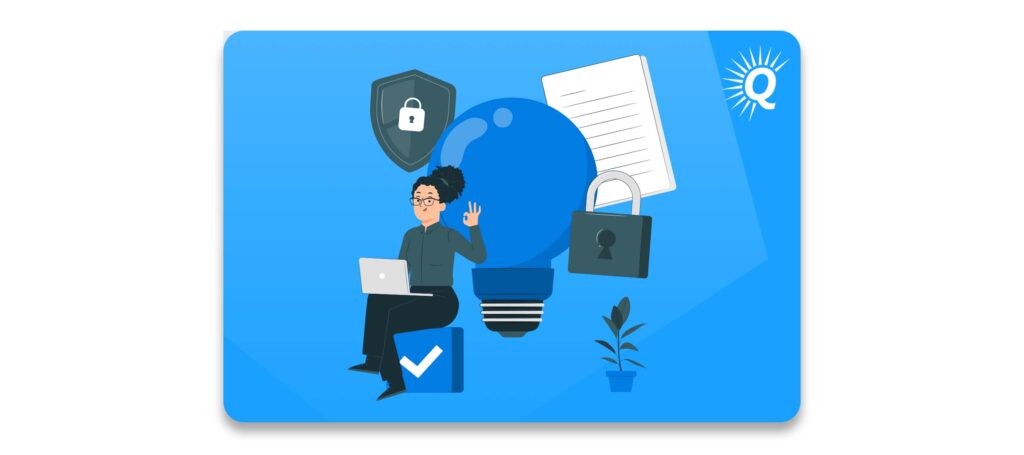Topics:
Never Miss a Beat - Get Updates Direct to Your Inbox
FILTER:


Shh! Top Tips On How to Maintain Confidentiality When Selling Your Business
By Quiet Light
If you’re thinking about selling your business, you’re probably wondering how to maintain confidentiality throughout the process. After all, you don’t want the news of your business sale to leak out to your employees, customers, or competitors before you’re ready to make the big announcement. But how do you keep your exit plans under wraps while finding the right buyer and negotiating the deal?
From keeping your business secrets safe to establishing clear guidelines on who has access to sensitive business information, this article covers everything you need to know about maintaining confidentiality during the sales process.
In this article, we also discuss:
- The four reasons confidentiality matters
- How to maintain confidentiality when discussing your business with potential buyers
- How (and when!) to share the news of your business sale with employees
- When you should require a prospective buyer to sign a confidentiality agreement
Related Article: How to Get Your Business Ready to Sell


Why does confidentiality matter when you’re selling a business?
Before we dive into the practicals of maintaining business confidentiality, let’s take a look at why confidentiality during the sales process matters in the first place.
Confidentiality is critical when selling a business because it protects sensitive information about your company. Other reasons why business confidentiality matters include:
- Protecting your business value
- Preventing information from leaking about a business sale impact employee morale
- Keep competitors at bay
- Protecting the customer trust that you’ve spent time building
Protecting sensitive information protects your business value
- Financial statements
- Intellectual property
- Customer data
- Trade secrets
By keeping business information sensitive, you maintain control over information and ensure that it is only shared with the people who need to know. Confidentiality helps protect the value of your business and increases the likelihood of a successful and profitable sale.
Leaked plans for a business sale can tank employee moral
If the news of your business sale is leaks to employees, it can have a significant impact on their morale. Employees might become anxious, uncertain, and even fearful about their future with your company.


A lack of confidentiality can also impact your company reputation, which makes it harder to attract new members of your team and retain key employees. To avoid those negative consequences, it’s important to prioritize confidentiality during the sales process, ensuring that only those who need to know about the sale are aware of the details.
Confidentiality can help you minimize any disruptions to employee morale and maintain the workplace culture you’ve worked hard to build for your employees and business.
Thinking of Selling Your Business?
Get a free, individually-tailored valuation and business-readiness assessment. Sell when you're ready. Not a minute before.
Confidentiality prevents competitors from taking advantage of your business sale
When your business is for sale, confidentiality plays an important role in preventing competitors from taking advantage of the situation. If your competitor were to find out that potential buyers are making offers on your business, they might try to poach employees, customers, or even your intellectual information. This could harm your business and impact its value, which in turn impacts your asking price.
When you maintain business confidentiality, you avoid giving competitors any unfair advantages. You also protect the integrity of your business during the sales process. Confidentiality also helps to ensure a successful sale and smooth transition to new ownership without having a negative impact on your business.
Business confidentiality preserves customer confidence
Finally, business confidentiality is important for maintaining customer trust and confidence. If customers hear that you’re selling from someone other than you, it could lead to uncertainty about the future of your company.
If your customers aren’t sure about what’s going to happen to your products or services, they might decide to support your competitors because of the stability they offer. By keeping the sale of your business confidential, you can continue to serve your customers without interruption.


How to maintain confidentiality during your business sale
Confidentiality is necessary during the business sale process. You want to prevent sensitive information leaking to your competitors — and you want to be in the driver’s seat when it comes to sharing news of a sale with your employees and customers.
Above, we shared the “why” behind confidentiality. Now, let’s get practical with some of our top tips for how to maintain confidentiality. The tips include:
- Limiting access to important information
- Establishing a system for information flow
- Using secure ways to share electronic data and information
- Being strategic about when you share the news of a sale with your employees
Applying the need-to-know rule
Potential buyers might be interested in reviewing your financial records, business website statistics, vendor and employee relationships and contracts—and more.
It is common practice for potential buyers to sign a non-disclosure agreement.This legally requires the buyer to maintain confidentiality of the business information that you’ll share with them during this phase.


Only disclose confidential business information to people who absolutely need to know. This small pool can include potential buyers, their advisor, and legal counsel.
Controlling information flow
Before any potential buyers ask to see sensitive business details, take the time to establish a clear protocol for sharing information. When putting together these internal guidelines, include who can access information, how people share information, and how to secure sensitive information.
Buy a Profitable Online Business
Outsmart the startup game and check out our listings. You can request a summary on any business without any further obligation.
Sharing information securely
When you share information about your business digitally, prioritize secure technology. You can share files with password protection or in encrypted data rooms to safeguard your electronic business data. This approach will help ensure that confidential information remains confidential and is only accessed by individuals who you authorize.
Telling employees about the potential sale of your business
Deciding when to tell your employees about the potential sales business is a bit of a juggling act. You might want to maintain total confidentiality to prevent the news from disrupting your staff. But on the other hand, you don’t want to keep your employees in the dark and risk damaging company morale or losing valuable staff members.
When the sale of your business is imminent, you’ll need to inform your employees about the upcoming changes. Your staff will want to know how this change impacts them both now and in the future, and early communication can help reduce workplace anxiety.
If there’s a risk that employees will hear rumors about the sales process, it’s important to be proactive and inform them before rumors start to spread. This can reduce the spread of misinformation. And iIf confidentiality is ever compromised during the sales process, inform employees about the news. This will help you maintain the trust that you’ve worked hard to build.


Four situations when buyers should sign confidentiality agreements
Here are four situations you’ll find yourself in during the sales process. In all of these, you should require a prospective buyer to sign a confidentiality agreement.
1. During the discovery phase
When a buyer is interested in your website, they’ll reach out to you to learn more about your company and you as a business owner. This stage of the sale process is the discovery phase.
On the first phone call with a potential buyer, they may ask you to disclose sensitive information. This may include business financials, customer lists, or other key details. They may also want to review your website traffic statistics or vendor contracts.
Before you share any sensitive information, you should require a potential buyer to sign an NDA to ensure that the information you share with them during those initial conversations stays confidential. They might decide to not purchase your business, and you don’t want them to misuse the information you’re about to share with them during discovery.


2. Before due diligence
During due diligence, a buyer will go through your business with a fine-toothed comb. They’re ensuring that everything you claimed about the performance of your business is legitimate. In other words, they’re working to verify that they are buying the company that they think they’re buying.
This means that potential buyers will have access to a wide range of confidential information about your business. To protect this information, require buyers to sign an NDA before conducting due diligence.
3. When negotiating the terms of the sale
Once a buyer is confident that your business is the right investment for them, you’ll enter into the negotiations stage of the sales process. You may need to share additional information about your businesses’ value and growth potential.
To prevent detailed information about your business and potential future products or services from being shared with competitors or third parties, you should require a buyer to sign an NDA before discussing those topics.
4. After the sale is completed
Even after the sale is completed, there might be ongoing confidentiality obligations that require the new business owner to keep certain information confidential.
If the sale of your business includes ongoing obligations such as non-compete or non-solicitation agreements, you may need to require the buyer to sign an NDA to ensure they comply with those obligations.


Other instances of NDAs after the sale include intellectual property protection, the protection of continuing relationships, and the prevention of misuse of information. If there’s a risk that confidential information may be disclosed or misused after the sale is completed, it may be necessary to require the buyer to sign an NDA to protect your interests.
Conclusion
Maintaining business confidentiality is incredibly important. But it can also be one of the most stressful components of the sales process. You’ll give potential buyers a behind-the-scenes look at your business while they’re still deciding if they want to buy your business.
When it comes to business confidentiality, it’s always best to err on the side of caution. Take proactive steps to protect your interest and the business that you’ve built.
By following our tips, such as requiring NDAs, establishing information flow, and strategically sharing with employees, you can reduce the risk of confidential information leaking. With careful planning and intentionality, you can safeguard your businesses’ sensitive information and work towards a smooth and successful sale.
Thinking of Selling Your Business?
Get a free, individually-tailored valuation and business-readiness assessment. Sell when you're ready. Not a minute before.





